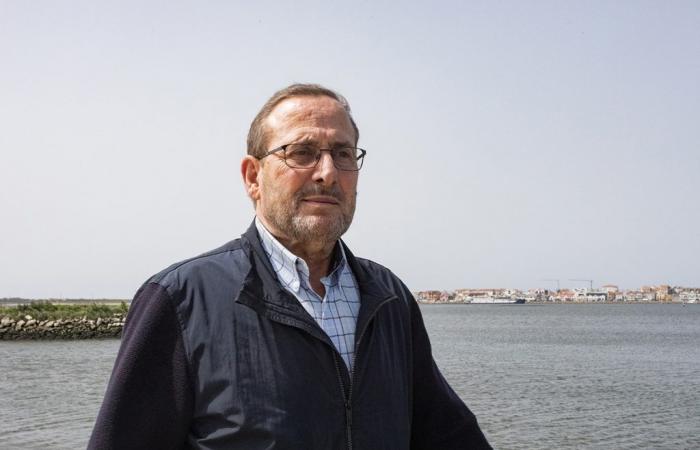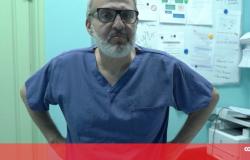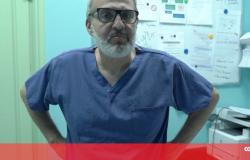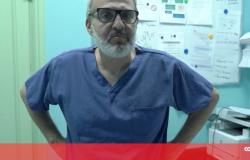“maybe one day in April/April will be reborn stronger/that this April is not April/it’s bad luck clover.” This is what António Vieira da Silva wrote in “Marginal: brief poems and songs” (2002). More than 20 years later, the singer-songwriter and doctor from Ilha Grande, recently honored by the Municipal Council of Ílhavo, continues to note that there are still advances and setbacks in relation to the ideals of the 25th of April 1974. The same ones for which he fought through his songs, some of which were prohibited by the regime.
Adriano Correia de Oliveira and José Afonso were (and continue to be) his great references. At 77 years old, about to turn 78, António Vieira da Silva still continues to play and sing, but less frequently, he admits in a conversation with Aveiro Mag. Even though he does not have any militant card, he did not turn his back on politics, being part of PCP lists more than once. At an associative level, he collaborated with Obra da Criança, Os Ílhavos and the Associação Chio-Pó-Pó and belonged to the cultural section of the Illiabum Clube. He belonged to the editorial team and was director of “Mundo da Canção”.
Were you born in Ílhavo?
I was born in the old Ílhavo hospital. There are many things from my childhood, all spent in Ílhavo, that I no longer remember. I lived well, even though I was aware that there were great differences between people, mainly in economic matters. My father was an office worker at the Vista Alegre factory and my mother was a seamstress.
When I was in high school, I had a drawing teacher, Professor Maria Vieira, from Ourivesaria Vieira, who got along very well with me and thought I drew very well. She asked me what I thought I would do next. She told him she was thinking about going to Medicine. She told me: “Don’t do that! You are only being influenced by the readings of Fernando Namora and Miguel Torga. Do not go. I believe you can be a good doctor, but the course is horrible. It’s necessary to fight. You’re going to be stupid.” I really didn’t like the course very much. I went there for almost ten years. It’s true that I lost one in the strike, but if it weren’t for the strike I believe the year would also have been lost. I was terribly afraid of exams. He even avoided exams.
Do you think you were really influenced by the readings or did you have a vocation to be a doctor?
I left home saying I was going to enroll in Mathematics. I was always a good Mathematics student, curiously enough, with the exception of the last year of high school, in which I was bad. When I was in line at the university office I started thinking and when it was my turn I signed up for Medicine. Professor Maria Vieira even told me to repeat high school in the area of Literature and, if necessary, she would cover the costs. Since I wasn’t going to study Architecture – which, in the teacher’s opinion, should have been the first option –, at least, I was going to Literature. Going back and having to put up with all of this? No. And I went to Medicine.
I went to Public Health and did the Medical Service to the Periphery, which, at the time, was still being done. It was a very interesting experience. It was in Lousã. It was that time when we thought we were going to have a completely new country. We worked long hours a week and never required overtime. I did the Medical Service to the Periphery with a doctor from Ílhavo, Isabel Casal. I really enjoyed the experience. I got tired of working, but I liked it.
Then he specialized in Public Health…
A lot of things in my life happened to me without me planning or looking for it. Doctor Gama Vieira, district health director, had been insisting that I go into the Public Health specialty. At one point, I got tired of the hospital. Patients were treated like numbers – bed five, bed three. I met Gama Vieira on the street and agreed to go to Public Health. I took the course in Lisbon and after a while he told me that I had to choose the health center where I wanted to go: Penacova, Lousã or Penela. Penacova, no, because it has a lot of curves; Lousã, no, because I knew the health delegate there and knew there would be problems; I’ve never been to Penela… I went to Penela.
The day I arrived in Penela was when I realized I had already been there. What a tent!
I had been there to sing at the invitation of a school in a hall. She had been there in ’76, when it was still very hot. On the stage, there were some people from Penela and the priest. The audience was almost entirely cycle students. During the concert, I told the young people that, contrary to what was said at the time, communists did not eat little children. She happened to be in conversation. I was a PCP supporter, but I was never a member. And one of the kids answers me: “But the priest at mass says yes!”. What a tent! “The priest did not lie. He thinks it’s true. He must have heard that and believed it,” he said at the time.
Now, when, after three years, I returned to Penela as a doctor, the priest was the same. I immediately thought: I’m ready! But I got along well with the priest.
He even became a candidate for the Chamber of Penela…
Yes. I became a candidate for the APU, at the insistence of my comrades from Coimbra. I got a hell of a scare one day when I went out into the street and saw my face – a horrible photograph – on a huge billboard. What is certain is that the campaign went well. The certain victory was always for the PSD. On the PS side, Dr. Arnault – even before the National Health Service was born – asked me to leave the APU and join the socialist list, but I told him I wouldn’t do that.
I warned people not to get into wars and, during the campaign, I even sat at the same coffee table with the PSD and PS candidate. Of course we had a miserable vote, but we were able to elect a deputy to the municipal assembly.
What were your college days like?
I went to university in 1965. I was hit by May ’68, the crisis of ’69… In ’68 I was in a fado group, a young people group. Then I started experimenting with composing my own stuff and ended up starting to sing. Here’s another thing that happened to me without me asking: I competed in a popular music competition in Figueira da Foz, organized by a radio program – the presence of Coimbra, by Sansão Coelho. I had worked for him at the time of the Strike, arranging advertising for the radio, so when he organized this festival, he also asked me to help him. But we started to see that there were few competitors. He said “You have to compete! You leave the organization and compete.” I competed and was lucky enough to win. The jury was made up of journalists. It was at that time that I met Fanhais and Adriano [Correia de Oliveira]. In a second session, those who also belonged to the jury were Mário Castrim and Alice Vieira.
The prize for that contest was to record an album, but the prize never appeared. It was postponed, postponed… Later, with my help, Sansão Coelho organized a show in the Ílhavo pavilion. We needed a well-known artist and he remembered Mirene Cardinalli. She was his friend and he got her to participate.
At the end of the show, to my surprise, Mirene told me that she had really enjoyed listening to me and that she was going to talk to her publisher about me recording an album. I thanked him, but I was a bit cynical because I thought it was nothing more than a nice circumstance. Shortly afterwards, they called me from Lisbon. “Get ready to come to Lisbon because Francisco Nicholson is going to call you”. I went to Lisbon to be heard by Nicholson and Armando Cortez in a studio in Chiado. That afternoon I sang for them, I played the viola badly (I still play it today). I sang three songs, but in order to release the EP I needed one more. I sang “Song for a sad people” and Cortez immediately said “Not that one”. “Not that, why?” asked Nicholson. “Because it will be banned”, explained Cortez. “I hope so!”, said Nicholson, “it sells more!”. She stayed. And it was banned.
You already wrote songs with the idea that they would be banned. Was it your way of fighting?
My songs were all against the regime, influenced by Adriano [Correia de Oliveira] and José Afonso. We believed that it was our way of fighting, that we had some influence.
Worth it?
Yes. I think that, fifty years later, this is still not resolved. There are advances and setbacks. It wasn’t quite what we imagined, but maybe that wasn’t possible either.
Were there songs censored?
The “Song for a sad people” was banned. I lived on Rua Antero de Quental, in Coimbra, next to the PIDE headquarters. Every day I came across PIDE agents, they were all wearing raincoats. Nicholson called me to tell me not to sing around Coimbra in the following times. PIDE had been at the label, but it was just an office, there were no records stored. The records were with Arnaldo Trindade, in Porto, for distribution. Nicholson informed Arnaldo Trindade and, when PIDE arrived at the warehouse to seize the records, they only had eleven copies of the 500 that had been released – there was, later, a second edition of 1000. The PIDE agent asked if he could keep with one, since the daughter collected everything that was seized. Only ten records were seized for registration. On the same day that they seized my album, they seized “Je t’aime moi non plus”.
… “I sing despair
fatalist
of those suffering
if you let it stay
tired eyes
hoe in hand
working the land
who will steal from you
I sing my poem
of revolt
to the dead people
who doesn’t want to scream
It’s time to be happy
that the day has come for fear to end.”
Excerpt from “Song for a Sad People”






